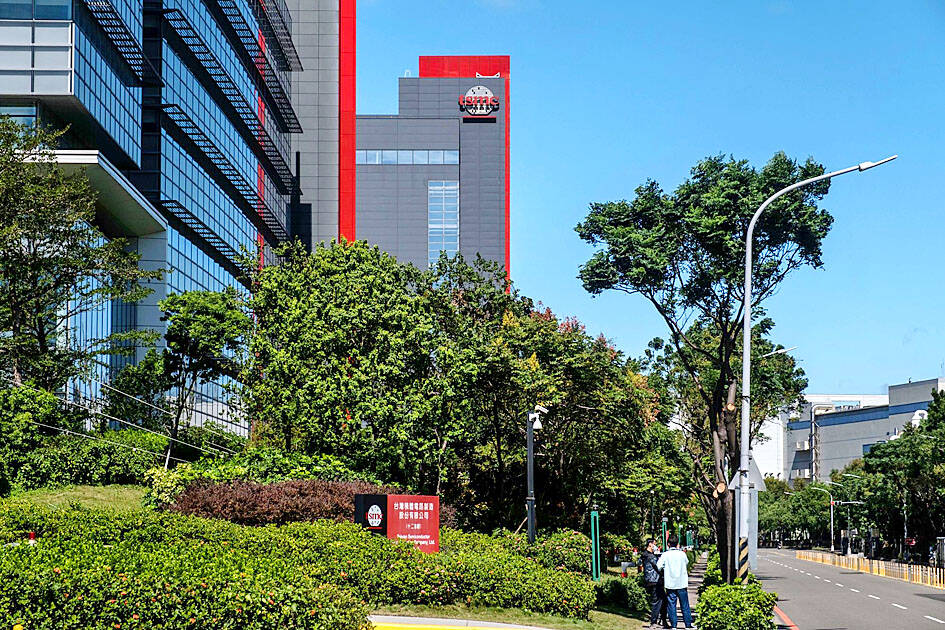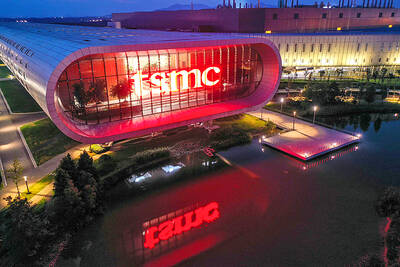Warren Buffett slashed his holding of Taiwan Semiconductor Manufacturing Co (TSMC, 台積電) just months after disclosing a major stake, an unusually quick reversal by the billionaire investor that is chilling investor sentiment toward the chip giant.
Buffett’s Berkshire Hathaway Inc cut its holding of TSMC’s American depositary receipts by 86 percent last quarter, the company said in regulatory filing on Tuesday.
Assuming it sold them at the average price over the period, the stake sale would have fetched US$3.7 billion.

Photo: Lam Yik Fei, Bloomberg
Shares of the world’s largest chip foundry slid as much as 4 percent in Taipei yesterday following the news, amid broad market losses.
They closed down 3.67 percent at NT$565 on the Taiwan Stock Exchange, contributing about 165 points to the overall drop of 221.59 points on the TAIEX.
Concerns over the prospects of the industry might be the reason for Berkshire’s quick sale of TSMC receipts, equity market analyst Wang Chao-li (王兆立) said.
Global semiconductor sales were down in the second half of last year and industry production value is expected to contract this year due to excess inventory, Wang said.
TSMC shares jumped in November last year amid news that Buffett had acquired a stake of about US$5 billion, and they are still up more than 40 percent from an October low.
“It’s surprising that Berkshire cut its holding so much in just a quarter, which differs from its past practice of long-term investment and continuing to add shares,” Taishin Securities Investment Advisory Co (台新投顧) vice president Tony Huang (黃文清) said.
The chip industry has had to contend with COVID-19-induced supply disruptions in China and a slump in demand for electronics amid surging inflation.
TSMC cut its spending target by about 10 percent last year to about US$36 billion after the administration of US President Joe Biden imposed new restrictions on China’s access to critical technologies.
The economics of the industry are shifting, too. Amid US-China political tensions, governments in Washington, Tokyo and Brussels are all pushing TSMC to help build local production capabilities.
This threatens to drive up its costs.
The Hsinchu-headquartered chipmaker’s shares had rallied amid a rise in global chip stocks as investors tried to gauge a bottom. It last month extended gains even after it announced plans to further lower spending and signaled its first quarterly revenue drop in four years.
While the stock would likely be affected in the near term on news of Buffett slashing Berkshire’s holding, TSMC’s longer-term outlook is still positive, Huang said.
“Many global investors continue adding its shares with its fundamentals improving, including better utilization rates and its leadership role in advanced technology,” he said.
Last quarter, Berkshire also cut back its exposure to Activision Blizzard Inc and reduced financial holdings by selling shares in US Bancorp, Bank of New York Mellon Corp and Ally Financial Inc, the filing showed.
At the same time, Berkshire bulked up its investments in Apple Inc, Paramount Global and Louisiana-Pacific Corp.
Apple remained the company’s largest holding by market value, although the value of that position fell by US$7.4 billion in the period.
Additional reporting by CNA

DOWNTURN FORECAST: Revenue grew to NT$200.05 billion last month, making it TSMC’s best January ever, but revenue could dip by up to 16 percent this quarter Taiwan Semiconductor Manufacturing Co (TSMC, 台積電) yesterday reported annual revenue growth of 16.2 percent to NT$200.05 billion (US$6.64 billion) last month, indicating that the world’s biggest contract chipmaker and a sole chip supplier for iPhones was unfazed by quarters-long supply chain inventor
Global index provider MSCI Inc has raised Taiwan’s weighting in one of its major indices, but left the country’s weighting in two others unchanged.MSCI yesterday said in a statement that following a quarterly review, it increased Taiwan’s weighting in the MSCI All-Country Asia ex-Japan Index by 0.03

NEW IDENTITY: Known for its software, India has expanded into hardware, with its semiconductor industry growing from US$38bn in 2023 to US$45bn to US$50bn India on Saturday inaugurated its first semiconductor assembly and test facility, a milestone in the government’s push to reduce dependence on foreign chipmakers and stake a claim in a sector dominated by China. Indian Prime Minister Narendra Modi opened US firm Micron Technology Inc’s semiconductor assembly, test and packaging unit in his home state of Gujarat, hailing the “dawn of a new era” for India’s technology ambitions. “When young Indians look back in the future, they will see this decade as the turning point in our tech future,” Modi told the event, which was broadcast on his YouTube channel. The plant would convert

‘SEISMIC SHIFT’: The researcher forecast there would be about 1.1 billion mobile shipments this year, down from 1.26 billion the prior year and erasing years of gains The global smartphone market is expected to contract 12.9 percent this year due to the unprecedented memorychip shortage, marking “a crisis like no other,” researcher International Data Corp (IDC) said. The new forecast, a dramatic revision down from earlier estimates, gives the latest accounting of the ongoing memory crunch that is affecting every corner of the electronics industry. The demand for advanced memory to power artificial intelligence (AI) tasks has drained global supply until well into next year and jeopardizes the business model of many smartphone makers. IDC forecast about 1.1 billion mobile shipments this year, down from 1.26 billion the prior

People stand in a Pokemon store in Tokyo on Thursday. One of the world highest-grossing franchises is celebrated its 30th anniversary yesterday.

Zimbabwe’s ban on raw lithium exports is forcing Chinese miners to rethink their strategy, speeding up plans to process the metal locally instead of shipping it to China’s vast rechargeable battery industry. The country is Africa’s largest lithium producer and has one of the world’s largest reserves, according to the US Geological Survey (USGS). Zimbabwe already banned the export of lithium ore in 2022 and last year announced it would halt exports of lithium concentrates from January next year. However, on Wednesday it imposed the ban with immediate effect, leaving unclear what the lithium mining sector would do in the